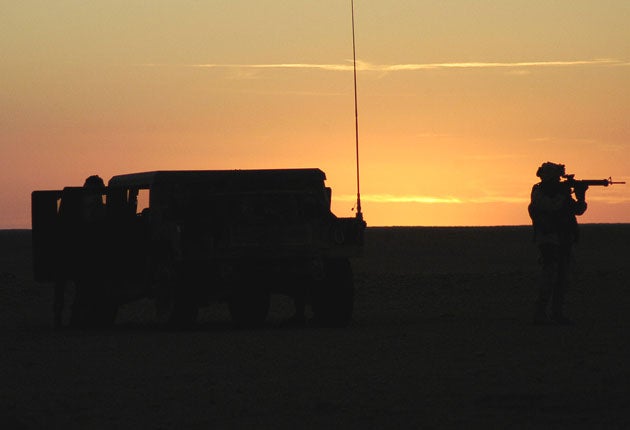KBR sued for forcing Nepalese workers to Iraq

Your support helps us to tell the story
From reproductive rights to climate change to Big Tech, The Independent is on the ground when the story is developing. Whether it's investigating the financials of Elon Musk's pro-Trump PAC or producing our latest documentary, 'The A Word', which shines a light on the American women fighting for reproductive rights, we know how important it is to parse out the facts from the messaging.
At such a critical moment in US history, we need reporters on the ground. Your donation allows us to keep sending journalists to speak to both sides of the story.
The Independent is trusted by Americans across the entire political spectrum. And unlike many other quality news outlets, we choose not to lock Americans out of our reporting and analysis with paywalls. We believe quality journalism should be available to everyone, paid for by those who can afford it.
Your support makes all the difference.One of America's biggest military contractors is being sued by a Nepali labourer and the families of a dozen other employees who say they were taken against their will to work in Iraq. All but one of the Nepalese workers were subsequently kidnapped and murdered.
According to the lawsuit filed in Los Angeles, the Nepalese workers were recruited in 2004 in their home country by KBR and its Jordanian contractors, Daoud & Partners, to work as kitchen staff in a luxury hotel in Amman. Once they reached the Jordanian capital, however, their passports were taken from them and they were sent to Iraq. While travelling in an unprotected convoy, the Nepalis were kidnapped and later executed.
"It doesn't appear that any of them knew they were going to Iraq," said Matthew Handley, a lawyer representing the only survivor and the families of those who were killed. "A few were told they were going to work at an American camp... They thought they were going to work in America."
The lawsuit says that, after the 12 men were kidnapped, the sole survivor, Buddi Prasad Gurung, was forced to work for 15 months against his will in a warehouse at the al-Asad air base before his passport was finally returned. The plaintiffs allege the "illicit trafficking scheme - from their recruitment in Nepal to their eventual employment in Iraq - was engineered by KBR and its subcontractor".
The lawsuit was brought under a new human trafficking law that allows foreign citizens to sue the US government, military or corporations over human rights abuses committed in their countries.
Earlier this year, the US Department of Labour ordered Daoud to make a payment of $1m (£500,000) to be split between each spouse and set of parents of the murdered 12 Nepalis. The company has so far failed to comment on the lawsuit.
The 12 Nepalis were seized by a group calling itself the Army of Ansar al-Sunna. The men were taken hostage on 20 August 2004 and shortly afterwards the kidnappers released a video of one being beheaded and the other 11 shot.
KBR, formerly known as Kellogg, Brown and Root and once a subsidiary of Halliburton, the company of which the US vice-president, Dick Cheney, was once the chairman, said: "The safety of our employees remains KBR's top priority. The company in no way condones or tolerates unethical or illegal behaviour."
Join our commenting forum
Join thought-provoking conversations, follow other Independent readers and see their replies
0Comments